Groaning dissection of Cassandra Clare's The Shadowhunter Chronicles | Because hindsight is 20/20 | Devoted booklovers, exit stage left.
Don't wanna be here? Send us removal request.
Text
Update
I used to post about going on hiatus or taking a shorter break with the blog (some of which I have deleted to clean it up a bit), but nowadays I feel like it might be inconsequental to always update changes on the posting schedule, especially since it's been all over the place and sporadic already the past few years. I also don't want to assume that anyone is so committed to my blog that such updates are necessarily needed, but now I've been feeling that I should at least say something, seeing as I've already mentioned that I'm pretty ready to begin with the final installment. So to whomever it may concern or might have waited for it.
Everything has been coming to a halt for a while now because I can't get that push to continue posting. I've been dealing with a complicated death of a complicated parent and handling all the necessary proceedings and some unnecessary by-products that come after a death. It has been hard to summon any will to continue with the blog amidst all that in addition to normal life and work, so the blog has taken a back seat for it. It feels ridiculous to say because right now the break between posts dissecting the books isn't even the longest it's ever been. But seeing as it might be, I just wanted to give this update here if anyone was wondering.
Otherwise all is fine, life is life and all, good things still happen and are present. I'll get back to posting when the goings-on are going less uphill than now, but as always, my inbox is open and welcome to any and all thoughts. :)
8 notes
·
View notes
Note
sorry to bring up character ages in tid again, but i wanted to run a theory by you about something i discovered.
in chapter 1 of clockwork princess, tessa is being fitted for her wedding dress and she says this: “he would look so young. they were both so young. tessa new it was unusual to marry at seventeen and eighteen, but they were racing a clock.”
clockwork princess takes place in september/october (i think??) of 1878, and their wedding was supposed to be in december. what i’m thinking that tessa must be older than what cc has told us (in both the family tree and the “new” canon she established with the 10th anni of ca). based on the quote, we can probably assume that tessa is either already seventeen when clockwork princess starts, or will be turning seventeen sometime between then and december. which assumes jem’s birthday is somewhere in there as well. so will and jem being born in 1860 is probably correct, but tessa was probably born in 1861.
Bottom line: cc can’t even keep her own canon straight XD. im gonna try to write my own time line to try to make sense of it sigjdnd.
Waait a minute. Wow.
So, yes. Tessa's birthday is said to be January 28, 1862. Clockwork Princess takes place from October to December, which means Tessa is sixteen and turns seventeen in January 1879, which is still a couple months away from the supposed wedding.
I guess they didn't have any confirmed dates of birth before the 10th anniversary edition of Clockwork Angel, just the birth years, but I found this part with Charlotte and Jem in Clockwork Princess, chapter 13 "The Mind Has Mountains":
You are still a child, Charlotte wanted to say, but she did not. He was only a few weeks short of his eighteenth birthday, after all, when Shadowhunters became adults, and if when she looked at him she still saw the dark-haired little boy who had arrived from Shanghai clutching his violin, his eyes huge in his pale face, that did not mean he had not grown up.
Which, of course, goes along with the whole
“Yes, though Charlotte’s rather fallen off in tutoring us lately, as you might imagine,” said Will. “One either has a tutor or one is schooled in Idris—that is, until you attain your majority at eighteen. Which will be soon, thankfully, for the both of us.” “Which one of you is older?” “Jem,” said Will, and “I am,” said Jem, at the same time. They laughed in unison as well, and Will added, “Only by three months, though.”
part in Clockwork Prince which takes place from July to August, but the rest of what was previously discussed gives the idea that they both have already turned seventeen in 1878, especially when juxtaposed with Gabriel's and Nate's ages and the rest.
Otherwise it does work that Will is born in late December and Jem's birthday is in November, other than that whole mess with being "three months" apart in age. But the language is weird, Tessa won't be marrying at seventeen no matter what, though Jem' would've recently turned eighteen.
Will telling Cecily that:
“You can’t be married, Cecily! You’re only fifteen! When I get married, I’ll be eighteen! An adult!”
Will turning eighteen a week or so after that Christmas when he proposed to Tessa works in that context as well. Though they apparently married two years later in March 3, 1880, according to the bonus content.
Though not exactly on topic, I want to point out that in said bonus content, Will thinks that "It wasn’t strictly a Shadowhunter wedding, because Tessa wasn’t strictly a Shadowhunter. But Will had decided to wear wedding gear anyway, because he was going to be the head of the London Institute, and his children would be Shadowhunters" though, at least according to the comic, James' conception was such a surprise because they didn't know if Tessa as a warlock could have children. And James was born in 1886, six years after the wedding.
Anyway, it's still a bit of a mess because, though some parts do fit, other parts of the text seem to have been written in another frame of reference in any case.
The timeline idea sounds fantastic!
10 notes
·
View notes
Note
i know this isnt rlly ur thing but the fandom is so cooked............ just trying to exist as an anti incest fan is impossible i constantly get told off by other fans im stupid and too serious or missing the symboism idk the fans make me think im takin crazy pills its crazy cause sometimes i think ur too harsh on cc but like the incest stuff i agree with and 4 some reason thats the hardest opinion for fans 2 accept idgi incest is worse than cassandra bein repetitive??
In general, it is problematic to declare certain views as correct under the guise of then ignoring differing ones. Why would some readers get to decide what is too serious and, for what even, stupid? What makes positive views towards the books more respectable and virtuous than those offering valid criticism? What gives the right to hand-wave the concerns some readers have just because you have no issue with them and raise that point above all others? When you suppress the opinions of others and tower over them by dictating how a book should be interpreted and liked, you are less likely to get those who think contrary interested in your views, albeit positive or negative.
Some of the opinions I’ve contested (for instance, those concerning the incest theme or the repetitive nature of Clare’s writing) and that I’ve ever come across seem (personally) to be approached superficially to some extent, sometimes even in untruthful way because of the incapability to understand where the criticism in question even comes from or how it even came about. It is easier to compare two seemingly similar things than to understand their meaning in their own contexts.
I know that no one really wants to acknowledge or listen to anything negative about what they love so much. It seems to be a downright personal insult or attack on your character when something so important and special to you is criticized. For which I think it’s important to separate yourself from that, know who you are and what you think and why, to recognize that something can be shit and improved and what more and that you still like it and/or are entertained by it.
Fiction is the place to safely entertain ideas so far out of our own lives, to challenge our thinking and ethics and moral even. So it’s not necessarily the content of a work that’s interesting or disturbing but rather the implementation of different elements and how they are executed with the rest of what makes a story. And that’s usually where I find my criticism towards Clare rising. Not what is included rather than how it is carried out and presented in the context of this particular author’s writing.
Everyone is entitled and free to their own opinions, as well as to how they consider and value others. It’s the tone of expression and how you treat people in face of disagreement that’s more noteworthy, I think. During the earlier years of the blog, I did receive messages from readers who were less than pleased with its contents or my approach on criticizing Clare’s writing, but I’ve always said and will always say that I’m just one person on the internet offering opinions, viewpoints, and criticism, and whether someone finds that helpful or not is not for me to decide. Though I am endlessly glad for all the people who interact and have interacted with me here and offered wider perspective and insights on different topics concerning TSC.
I don’t know what wisdom to offer, if any, but maybe it’s easier and brings less weariness to just do your own thing and engage less with the readership that does not welcome that type of discussion. I’ve personally had to do a lot of work on reflecting on things that I liked and their relationship to me (Clare’s works as the glaring example here), and coming to terms with that is not an overnight experience. Sometimes it’s also easier on yourself to think I disagree and move on than trying to understand each individual psychology behind every opinion.
I get that I’m sometimes harsh in my critiques. It’s just that I get feelings and the snark comes out, and I’m prone to hyperbole in terms of humor, so the end result is what it is. I’m not entirely happy and more disappointed in retrospect how I’ve conducted myself on some instances while trying to find the proper words and tone when approaching whatever the topic is at hand. And sometimes it doesn’t work and things go to shit. I’m good at being mean to words on paper, but it’s not how I want to be when talking and messaging with real people. :’)
#I laughed at the “missing the symbolism” honestly#Symbolism doth butter no parsnips#Reply#Anti Cassandra Clare
8 notes
·
View notes
Note
When you get to COHF, I am begging you, PLEASE talk about the fact that Clary and Jace had full-on intercourse in hell, and there were NO consequences for it! Literally! You would think having sex in HELL of all places would have some consequences, but literally ZERO! I read that book at 14 and was so sure that it would have some big effect later on, but nope. Never spoke about again. The two biggest Mary Sues can literally do whatever they want.
This exact thing was actually a point of discussion oh my god where does the time go six years ago on the blog. I originally talked about contrivances in Clare's stories and made a list which included an item of "Jace and Clary’s Safe Sex in the hell cave."
Which then haunted one anon who asked me to elaborate on it, and I explained how that whole thing even happened. That post was then commented on:
That part was so bad, if I remember rightly Alec was letting Simon feed from him or something? The whole sex in the water in a hell dimension is bizarre and probably some weird fantasy of CC’s but why would anyone enter a pool in hell? Anything could be in there to attack or bite in sensitive areas…
To which my answer was: "Realistically speaking, isn’t water basically something people are most neurotic about? Whether it’s clean or clean enough to drink or wash dishes, that sort of thing. Let alone taking a skinny dip in it. In a DEMON REALM."
Another commenter then said that:
The cleanliness was handwaved. Apparently there were some water cleaning runes on the bottom of the pool
To which I said: "Wait, it just happened to be there or did they make it? I can’t remember for the life of me. If it just was there, in a demon realm, how CoNvEnIeNt."
The rune was there to begin with, so. That's how we circle back to contrivances.
9 notes
·
View notes
Note
what do you think about Clare saying she created Thule partly as a response to reviews calling Clary useless and stuff? Personally it made roll my eyes lol, no doubt there is *some* misogyny involved but like Clary is just written insufferably 💀 Like in CoLS (the book which opened my eyes to how bad TMI is but I digress) all I remember her doing was pining over jace, getting high and pining over Jace. And then in the climax she conveniently gets handed the sword (which her friends worked to get🙄) which she drives into jace and becomes the hero 🥳🙄 like that’s all i remember about her character across six books just plain bad writing but sure it’s all just misogyny to Ms Clare lol
Did Clare create Thule to hype up Clary? To tell (and never show) the “haters” how integral Clary truly was in the grand scheme of things because Clare herself did a shit job at showing and justifying any of that essentialness in TMI? What even. You can never completely rule out misogyny, for sure, but it was also Clare’s go-to excuse when faced with criticism on her writing.
The main problem (there are apparently many main problems according to me lol) is that Clary has no goals. Even from the very beginning the writing does bad job establishing even scene goals! Why does Clary seem so aimless when she wakes up in the Institute for the first time and barely thinks of Jocelyn until loads of pages later and after that even barely? Because Clare doesn’t set her any goals. Jace is who pulls the story forward, but that is also because Jace is the actual protagonist and Clary is there to observe stuff.
Clary becomes essential when Jace is either dead or possessed. And not because of her own drive and set goals or her instigating the plot brought her to that point. Clary is mostly—because there are times when she does take action on her own—is just dragged along the story and ultimately finds herself where she needs to be.
In City of Glass, Clary barely does anything towards waking Jocelyn up. Other characters do that work for her and she finds herself in the right place because of that. Otherwise it’s just Jace this and Jace that and Sebastian who. She stands up and takes action when it comes to the Alliance Rune, and it was the first time in the series that I felt some sort of impact from her words. Then she jumps into action by portaling into the Lake Lyn, once more completely unprepared and almost kills herself if not for Valentine.
City of Fallen Angels is so criminal for dragging Clary along. Clary barely interacts with the poor excuse of a rag-tag plot and still finds herself in the final showdown. Not because of her actions or anything she did had any actual impact. And she doesn’t get to do anything! Simon and Jace defeat Lilith!
City of Lost Souls is different just for the fact that Clary infiltrates Sebastian and Jace’s boyband and eventually discovers their plan and the place of the final showdown. But even during all that, she had no clear goals: she just wandered along, her “detective work” acting as a smokescreen for the fact that Clary still had no proper scene goals. Honestly Simon should’ve been the one to strike Jace down with Glorious. He had earned it.
Edit! Now thinking about it, oh oops, except there was this one tiny thing: the sword did not "activate" in his hands because he's not Nephilim, but blazed up in Clary's, so... :D I'm sure it could be worked around, Simon having ingested Jace's extremely angelic blood, and that having more consequence than just being able to walk in daylight. What a nice circling back that would've been also.
11 notes
·
View notes
Note
So recently I fell back down the rabbit hole that is the Shadowhunters series about five years after I finished all the available books with City of Heavenly Fire. While The Mortal Instruments and The Infernal Devices haven’t really stuck significantly in my mind until I stumbled across your critiques of City of Lost Souls, it is a different story with The Dark Artifices. In a very bad way. Trite writing, a weird focus on features considered “exotic” (Emma’s blonde hair, Julian’s blue-green eyes, etc), generally poor character writing, the standard faire of issues that come from CC’s writing. But in particular I remember having issues with Ty Blackthorn and how his autism was portrayed, as someone who was professionally diagnosed. From what I recall from his arcs (specifically in QoAaD) a lot of his actions felt steeped in vainglory, him being confused about Kit leaving with Tessa without saying goodbye after heavily hurting Kit emotionally during the attempt to resurrect Livvy is the foremost example I can think of. It honestly really fucked with me when I first read it and made my internalized ableism a lot worse, something I am still trying to get over even now, as it made me afraid that is how other people saw me due to being on the spectrum. All that aside though, I wanted to ask you, since you generally are more familiar than CC’s work than I due to reading it at a more recent time, if people do consider Ty to be good autistic representation, and why or why not that may be. I want to know if my malice for Ty and what felt like an extremely offensive and, dare I say, borderline stereotypical portrayal of autism is just me being a bitch or if it is a common complaint amongst those willing to criticize Clare’s work.
Sorry if that was a massive fucking word salad I’ve been meaning to ask someone this question for almost half a decade after reading QoAaD😭😭
THE BLACKTHORN EYES. You shan’t forget. It’s been five years since I read Queen of Air and Darkness and I haven’t.
I find it difficult to assess to some degree how good a specific representation is. As to Ty, I’ve seen readers being incredibly happy with him and then vice versa like you. The difficulty lies in the way I think it’s misleading to look for general assertions in characters like Ty. How could you possibly represent a whole group of people that exists on a spectrum with varying degrees of symptoms that manifest in wide variety of ways with just one character? Another facet to the difficulty in assessing the quality of representation (Ty’s or in general) is that I hardly, if at all, identify with or like characters based on some traits they possess rather than how the character is in general, how the character works within the story, and what their dynamic is like with the other characters. The impression of a character is created in interaction with all the other elements of the book.
Ty is just one individual, and I’ve never looked at him as anything other than him being a representation of who he is, not what other people with autism generally are. Ty was based on a son of Clare’s friend, so I’d feel weird completely denouncing Ty's character, especially as someone not on the spectrum. Then again we all know how badly Clare translates real life stuff into her works and her writing, so… That being said, there are certain characteristics—I mean there has to be for a diagnosis even to exist or to be made—that need to be present. And those present with Ty, as you said, seem borderline if not exactly stereotypical.
What I am trying to say is that in and of itself and completely separate from the other elements, I don’t think Ty is the worst written character. My issue with Ty’s representation lies in its utilization in the story. For years now, Clare’s inclusion of different issues (social, societal, psychological, medical, neuropsychiatric etc.) has seemed more performative than genuine, which is relayed by the fact that the stories do not really focus on these issues, but mostly sidesteps them in favor of some boring aspect to the main romantic relationship. What truly then infuriates me, is treating what is supposed to be that representation almost as the sole aspect to that character, completely over-saturating their existence with this one (in this case) disorder, and then use it as a tool to elevate other characters.
The problem is glaring when Ty doesn’t live outside of that fact that he has autism but rather becomes the embodiment of it (especially considering there are no other characters with autism included in the series). People are more than their disorders, and though they are massive parts of everyday lives and sources of serious struggles to some people, reducing someone’s existence to just that is not it. Ty was there for the purpose of elevating Julian’s devotion and care for his family, to emphasize the love he has and the lengths he would go to in order to protect them. Clare wrote in one of her answers that she was glad people picked up on Ty’s autism, but how could they not? It was pushed into almost every scene he was in just so the readers would take notice. Clare does not know subtlety or subtext or have any sense of proportionality for which the writing was excessive.
You’re not a bitch lol, and what you said here is a common criticism from what I’ve ever seen. I don’t think you really need my take on whether to hold onto your malice (just offering my winding perspective here, bon appétit), since here you have justified and reasoned your opinion and feelings about Ty completely appropriately. Though it’s been years since I’ve interacted with anything to do with Clare’s fans or their opinions other than book reviews, I’ve found that the readers who tend to praise her writing rarely have such distinguished reasons for why so.
Word salads are always welcome. I feel like I’m offering you one in return. :’)
10 notes
·
View notes
Note
one thing i'll never understand is why so many fans are still riding for the idea of tessa loving both will and jem equally when the author didn't show that in her writing. yes, clare made tessa telling us that she loves them both in the same way and that it could not have been otherwise and also made some statements about it, that “not everyone can understand this type of love” or something like that, but is that true? or maybe she lacked the writing skills to make tessa's love for both of them believable? because, from clare's tid trilogy, all i can understand is that she just loves will so much that all of the story basically revolves around him even though tessa is the main character (and i always wondered what this trilogy could have been if we had him as a protagonist alongside jem). i could add a lot more—jem being an underdeveloped character, clare not giving us his pov, tessa treating him like a placeholder because will rejected her etc—but i want to hear your thoughts
Here are couple posts [x] & [x] & [x] I wrote about this very subject once upon a time. I’ll reiterate couple points from those.
The feeling of Jem being a placeholder is exactly what Clare’s capabilities as an author has created. Her execution of love triangles—called that only by name—suck because she cannot fully commit to them. She knows the end which is Tessa with Will, one of Clare’s great loves, so she spends her time churning out awful prose about him and forgets to hold Jem to the same standard. Clare does not treat Jem reciprocally or even as a truly viable option for Tessa’s first proper relationship.
Tessa’s attraction and eventual love for Will is so over-pronounced that it never seemed like Tessa truly loved Jem as passionately as she loved Will, despite that “two great loves in a lifetime” was the zinger. Will was blatantly obvious endgame from the very beginning. Tessa and Jem were engaged, but Jem was more invested in the relationship than Tessa who incessantly kept pining after Will during her engagement to Jem (and tonally her feelings and thoughts read more like pity than love to be honest).
Jem feels like a placeholder because he is a placeholder. Jem wasn’t independent as a character from Will like Will was of him. At least in the first book, he was primarily there to narrate Will and show the kinder and caring side of Will that Will himself was intent on hiding. Jem was a gateway for Tessa to see Will as Will truly was, because Jem was the sole person with whom Will was his genuine and truthful self.
Will has a strong character on his own while Jem’s is dependent on other characters and the existence of the love triangle. And so, as Will and Tessa’s mutual attraction to each other begin to develop, Jem’s role in Tessa’s life was aside from the aforementioned more of a confidant and a voice of reason. Tessa and Will connected over their love of literature and similar taste in books—now that I think about it, what else even was there? Either way, Clare failed to build a similar connection with Tessa and Jem like she did with Tessa and Will. Though both Tessa and Will were shamelessly self-indulgent inserts to discuss Dickens, at least they had that, no matter how feeble a basis it is.
While Clare may claim that Tessa’s love for Jem was equal to that she had for Will, all she managed with her writing was Tessa pitying Jem and pining after Will. It’s a love triangle between contrivance, convenience, and incredible annoyance.
6 notes
·
View notes
Note
i've come across one of your old posts about the poc shadowhunters and i don't know if you have already talked about it, but have you noticed too how much cordelia is sexualised in the series? as a woc myself i found the costant comparison of her figure to grace's to be .. i don't know, unflattering? unnecessary? since i was i teenager i have always compared myself to my white girl friends and i understood why cordelia did the same, but why all of the characters interested in her (james, matthew, lucie) are always talking about her body and how big her boobs are? and i noticed the same thing with christina too. do you think this is one of cassandra's patterns or am i reading too much into it?

It’s a pattern for sure. The sexualization of teenage characters has been an issue in the Shadowhunter series since its conception, but something in the specific and recurring focus on Cordelia’s breast and curves in The Last Hours was deeply disturbing. Another pattern that keeps repeating itself—the one sure constant in Clare’s books that you’ve picked up as well—is the female protagonist being compared to other female characters. Chain of Gold very early on sets Cordelia against Grace, more so appearance-wise. While the juxtaposition between them as to their relationships with James—in fact, the whole setting only exists because of their relationships with James—somewhat extends beyond their looks later on in the series, the first impression Clare decided to go for is their differing looks and how it relates to James Herondale’s affections. In Chain of Gold, Cordelia is first described (or rather she describes herself) as following:
"Cordelia was of the opinion that she looked awful. Pastels were all the rage in the fashion papers, but those papers expected girls to be blond, small-bosomed, and pale-skinned. Cordelia was decidedly none of those things. Pastels washed her out, and even the corset couldn’t flatten her chest. Nor was her dark red hair thin and fine: it was thick and long like her mother’s, reaching to her waist when brushed out. It looked ridiculous in tiny curls."
The writing emphasizes Cordelia’s looks not being that of a European/English white woman and points at the problem in fashion that prioritizes light-skinned women and caters to everything that Cordelia isn’t. We begin with the point that Edwardian fashion is definitely not for her, so when Grace is described by Cordelia after the latter learns it was not Cordelia James was “in love” with, it draws a direct line between the two reflections here, between their looks, and the generally (socially) perceived preference of one over the other:
"Cordelia looked over at James and Grace reluctantly. They made a stunning picture, his dark hair and her fair icicle beauty. Like ashes and silver. How, how, how could Cordelia ever have thought someone like James Herondale would be interested in someone like her?"
Cordelia beats herself up and feels inferior because she doesn't look like the ghostly Grace, the epitome of western beauty standards apparently. The book then does a poor job at addressing much of this in any meaningful level outside of Cordelia’s love for James. In my recollection, this wasn’t contemplated as an outright racial thing either, weirdly, by the writing. If it was, I’d expect the writing to elevate it far more. But then again, I’m certain Clare didn’t want anything that could be interpreted as potential racial preferences reflecting badly on James—though this is exactly how it reads when combined with the previous observation Cordelia makes of herself. The writing does bring up another point of view into this as Cordelia thinks the following:
"Cordelia felt numb. Well, of course he had run off, then. Every summer he had seen Grace save this one; how he must have missed her. She had always known James possessed a life she knew little of with his friends in London, but she had not realized how very much she didn’t know him. He might as well be a stranger. A stranger in love with someone else. And she, Cordelia, the interloper."
Though the connection, I think, with the first two is stronger as those parts follow each other in 10 pages and are more connected as this excerpt is somewhere 50 or so pages after. Yet the writing does not seize it as a worthy focus. This becomes more evident as Chain of Gold itself that introduces the whole idea of Cordelia feeling not enough or worthy because of her darker skin or curvy figure begins to veer away from that and establish the comparison between Cordelia and Grace being that of Fire and Ice, warmth and coldness.
The color scheme around Grace is white-gold, white-blond, ice-blue, silver, and ivory at its core. She is described by other characters as cold, statuesque, like a fire blazing in the heart of a glazier, her beauty being cold, like the shadow of a shadow, lacking vibrancy and color, pale; her dress was a cloud of ivory net, worn over an ice-blue satin underskirt; a pale woolen cape trimmed with fur at the throat and carried a matching fur muff. Her hair was pinned up in an arrangement of tiny plaits threaded with silver ribbons. She looked like the Snow Queen in a book of fairy tales; a dove-colored leather glove appeared, followed by sweeping ivory-colored skirts and a short coat of pale mink, topped with a head of upswept silver-blond hair, glimmering like metal in the sun; she wore a cream wool dress embroidered with blue; Her face was almost waxen in its pallor—beautiful but still, like a doll’s; her hair, loose around her shoulders, glinted silvery bright; a pale girl in an ivory dress, her hair the color of creamy-white rose petals.
Whereas Cordelia’s is of warm colors, her dark red hair a point of constant focus elevated above other aspect to her appearance (though her skin tone still earning mentions as well): a deep dark red, like fire shining through blood; her deep red hair curled against her cheekbones,James thinking catching sight of her red hair, her red hair caught back in a braid, her light brown skin gleamed in the witchlight, her hair tumbling back like a waterfall of autumn leaves, her unpinned hair falling down around her shoulders and spilling down her back, the deep red of rose petals and stroking her bare brown skin like silk, her and Cortana together being like a poem written in fire and blood, her body curved and moved like water or fire (like, you tell us which it is??); her hair swept from side to side, an arc of fire; her brown skin glowed, she seemed to blaze like a torch; she was all fire, all heat and light, from the gold silk roses woven into her dark red hair to the ribbons and beads on her golden dress; her red hair undone, spilling down her back like a river of fire; flame-dark hair, her hair shining like a new penny, long strands of flame red spilled down around her face, a dress of almost the same flame red.
These are some picks from all three books of The Last Hours. As to the sexualization of Cordelia, it begins with an oomph as soon as something awakens in James during their escapade in Hell Ruelle as he witnesses Cordelia performing on the stage.
"Cortana wove with her words, underlining each one with steel. She turned as her sword turned, and her body curved and moved like water or fire, like a river under an infinity of stars. It was beautiful—she was beautiful, but it was not a distant beauty. It was a beauty that lived and breathed and reached out with its hands to crush James’s chest and make him breathless."
Seems like a jab at Grace. Regarding all three instalments, my notice was that Cordelia’s curves, breasts, body, and all are sexualized almost exclusively from James’ point of view. Once we proceed to Chain of Iron, the writing effectively divorces itself from the premise that Chain of Gold in the two first excerpts above introduced and emphasized for Cordelia’s personal anguish over James. And that is also where the problem of over-sexualizing Cordelia really breaks loose once James and Cordelia become more intimate and have those scenes.
Chain of Iron (or Chain of Thorns for that matter) doesn’t really care about rubbing Grace’s existence in Cordelia’s face in the same manner—i.e. looks-wise—because Cordelia and James are entering marriage and an agreement which brings them closer together and James closer to breaking the enchantment of the bracelet and thus his true feelings (his lust) for Cordelia. Though Cordelia remains in the belief that James still longs for Grace despite the arrangements both have with Cordelia and Charles respectively, the writing no longer bothers with the juxtaposition between Cordelia and Grace in the same vein anymore. The writing barely describes Grace at all, which contrasted to the absorbent amount of Cordelia’s figure being described could be the reflection of James’ focus and true interest, but… yikes.
Grace is more a plot hindrance in the relationship between Cordelia and James and no longer warrants constant reminders of her looks in comparison to anything other than her own persona enwrapped in coldness because of her past and present trauma (that is ignored by most in favor of James). She is the possible infidelity that adds to the complication of Cordelia’s feelings and what powers her actions, though Grace’s own storyline takes her far enough away from James and closer to Jesse and Lucie. Grace is the conflict that still exists between Cordelia and James, and James reflects on this:
"Would it be like that with Grace, when they were married? James wondered. He had never felt comfortable around Grace as he did around Cordelia. Perhaps that was the difference between love and friendship. Friendship was more easy, more relaxed."
Though Grace is doing her own thing trying to save Jesse with Lucie, she is still present and a point of comparison in James and Cordelia’s relationship. But because Grace is physically mostly removed from their situation, James and Cordelia are bonding more and having many unreasonably explicit intimate scenes. I mean:
"...it was not relaxation he was feeling when he let his gaze roam over Daisy as she sat before the fire. He noticed everything about her as if he had been given a divine mathematical assignment intended to total up her charms: the shape of her mouth, the smooth skin of her throat and forearms, the curve of her neck, the soft swell of her breasts under her nightgown. She had been stunning tonight; he had caught quite a few men staring at her, at her curves poured into that green dress, at the graceful tilt of her head when she danced, at his gold pendant glimmering against her skin…." //MEN! This is a teenage girl.
"She was impossibly soft and curved. […] He’d tried not to stare, but he could still recall the shape of her body under the fabric. Now he could feel it: the indent of her waist, her hips just below his hands, flared like the body of a violin."
"He was helpless to stop his hands; they smoothed up and down her back, on either side of her spine. Her breasts were round and firm, pressed against his chest. He could tell she was wearing nothing under the chemise. He could feel the arches and hollows of her, and every touch seemed to unravel another strand of the thin thread of control binding his good sense. Blood pooled, hot and low in his belly. The fabric of her nightgown bunched up in his hands. His fingers curved over the shape of her, brushing the silk of her bare thighs, sliding up—" //Whenever Cordelia’s breasts are mentioned, James is for sure touching them in no time.
"Thin silk made hardly any barrier; he could feel her body all up and down his own, the shape of her: breasts, waist, hips."
"She heard his sharp inhalation as the fabric fell away, baring the tops of her breasts. He splayed his hand wide, stroking over her skin, even as he surged up to press his lips to hers again. She kissed him back eagerly, winding her fingers into the silky tangle of his black hair. His hand shaped itself to cup her breast." //Case in point.
"And then he had seen Cordelia—her head bent over her book, her hair shining like a new penny; she had been wearing a soft woolen dress that clung to her body, outlining every curve. He had nearly gone to her and kissed her, as any man coming home to his wife might do. Only at the last minute had he recalled himself, and turned toward the fire instead."
"He drew her closer, settling her against his chest. Her body relaxed against his, her head against his shoulder. He smoothed a palm down her back, trying not to let his mind wander to the warm curves of her body.”
"She wore a dress of almost the same flame red; James had never seen it before, and he’d thought he knew most of her clothes. This one was velvet, clinging to her breasts and waist, flaring out from her hips and thighs like an upside-down trumpet.”
Then there’s the whole sex scene in chapter 23 of Chain of Thorns, and now an abyss in me has been created, a hollow place in my mind birthed of the despair and disgust I felt when I went back to the books to look for these parts to present here. Anyway. Lawyered.
To discuss the patterns present in Clare's books, it's worthy to take a look at the previous series. If we wind back and consider TMI, Isabelle for sure has had her fair share of her breasts being on display, having “plunging necklines” and all, but what differentiates it from something like TLH is the tonality. I think that also plays a lot into it. For instance, Isabelle’s looks—in the earlier parts of the series especially—were approached from the perspective of Clary’s (Clare’s) not-like-other-girls mentality, Isabelle’s Femme Fatale contrasted to Clary’s sneakers, hoodies, and Raggedy Ann appearance that the hottest guy imaginable found more attractive than whatever Isabelle got going on (aside from the fact that Isabelle is also that guy’s sister but that’s neither here nor there). In addition to James’ unbridled and unhinged PoVs, in Chain of Gold Cordelia considering herself is written as follows:
She could not help but be conscious of how closely the dress clung to her body. The fabric over her hips was so tight that she hadn’t been able to wear a petticoat beneath it, only her combination and a light corset. Anyone could see the shape of her waist, the swell of her bosom, and even the silk draped across the curve of her stomach. The narrow sleeves slipped down her shoulders, uncovering the tops of her breasts; the weight and softness of the material was like a caress. She felt elegant in a way she never had before, and a little wild.
Cordelia’s looks being described here mostly have the tone of confidence and pride, not juxtaposed directly with some other female character’s either. What underlines more the sexualization of Cordelia—aside from the tone and the language used to describe her and all the other yuckety-yuck in the series—is the fact that other characters as well are in awe of Cordelia’s beauty, feel attracted to her, and are aroused by her. Grace is tiny, basically a ghost, helpless, and so petit she might break, but I don’t think the tone even in that juxtaposition is remarkably hostile like with Clary and Isabelle. What also attributes to the difference in tone is Cordelia’s compassion for Grace (which Clary never had for Isabelle):
"Cordelia could not help but wonder how much Grace concealed. It was not like her to approach James. Perhaps she had felt desperate. Cordelia could not blame her if she did.”
Worth to note, also Cordelia:
"Grace was wearing the same dress she’d worn to the picnic earlier, though the hem was torn and it was stained with grass. Not that Cordelia minded. There was something humanizing about Grace exhibiting even small imperfections."
Which I wouldn’t say is the same as Clary wanting to outright "destroy" Isabelle’s beauty by pouring soup all over her just for being beautiful. It's not because Grace is beautiful and Cordelia jealous/envious rather than Grace being generally regarded cold and statuesque. So, coming back to the TMI girlies: when Isabelle is described as “ribbon-slim,” it is because Clary feels herself to be “gigantic” in comparison (though Clary describes herself as slender with narrow hips?? She’s just a lot shorter than Isabelle??). Isabelle is exactly Simon’s type—tall, glamorous, and beautiful—and Clary is bitter because she is not all of those things in her mind or does not see her own beauty and value her own qualities in comparison to Isabelle. Jace finds Clary attractive because unlike Isabelle, who uses her beauty like a weapon, Clary doesn’t know she’s beautiful at all. Then there’s to consider that Isabelle’s looks—aside from Simon’s perspective probably—are approached also with negative judgement to her character and persona. Until the writing does 180 degree turn and Clare somewhat begins to like Isabelle without ever acknowledging Clary's enmity or the untruthfulness of it all.
I think Grace’s character was (strictly in this aspect and as to Cordelia, otherwise my opinion still stands that Clare shat on Grace) dealt with differently, more truthfully maybe, since it was her part in the scheme against Herondales and her inauthenticity that did justify the dislike others had for her. Unlike with Isabelle. Whenever Isabelle does anything—borrows her clothes to Clary, sits with Clary while the latter is unconscious, looks after Simon—there is always an air of disdain in the narrative and the way Clary feels about her when isabelle’s actions do not even support any of the ideas the writing wants to convey. Or justify Clary’s negative feelings and attitude towards Isabelle. When Clary acts hostile to Isabelle, Alec and Jace neither defend her nor call Clary out on her reaction because that’s where Clare sees Clary justified. When Clary says how Isabelle doesn’t like her, Jace says it’s because Isabelle is used to being the only girl around guys. Then we can wonder what guys since they have no other friends, but when they did have friends, it was Aline, and the only guys around Isabelle were her brothers but that’s another topic entirely…
With Clary and Isabelle, Clary behaves the way the narrative tries to say Isabelle behaves, but Clare had no awareness that what she told and showed were wildly different and contradictory, because Clary does everything she accuses Isabelle of, and Isabelle shows no signs of disliking Clary at all. This contrasted to Cordelia, who is adored by all and the girls around her are not vilified to that extent (except the mean girls Clare is insistent on always including that are then ridiculed by the writing because they are just one dimensional mean girls used as a fodder to prop up Cordelia who, on the contrary, is humble and kind). During the years Clare has written her series, the tonality has changed, but the pattern has not. When there is a hot guy as the main love interest, the laws of nature dictate that two girls must come together to compare each other, if not outright dislike each other first, and all of that comparison must exists in relation to that hot guy because otherwise: how would you know that Clary or Cordelia is The One? Or Tessa being compared to Jessamine by Will even though neither Jessamine nor Will even like each other in any way?
To somehow summarize this long-ass tangent, while the way Clare treats some of her characters is still pretty awful, it’ll probably never be as awful and hostile as it was in the beginning with Clary and Isabelle. Clare’s writing has evolved into some direction—I wouldn’t say anywhere good or better—but also into including more sexual tones and sexuality overall. That shift was noticeable in TDA, though the approach was a tad more discreet than whatever the hell Clare did with Cordelia and TLH overall (Anna and Ari for instance as well). TMI was pretty tame even with all the canoodling scenes Clary and Jace had, because I don’t think any other character in the series has been dealt the verbose hand Cordelia was. I honestly don’t know why. If she was an adult character, I might just cringe at the writing and constant descriptions of breasts and curves and then go on with my life, but as it is in reality, it’s just really depressing.
#Sorry for the wait#I'll try to get to the other asks as soon as I can#Cordelia Carstairs#James Herondale#Grace Blackthorn#Clary Fray#Isabelle Lightwood#Series Discussion#The Last Hours
10 notes
·
View notes
Note
Do you know how funny you are. I was stuck in a political death spiral and then looked up your blog to see what you've been up to since I checked on you last October, and oh my God, you're so funny. I'm so glad I'm not the only one who thinks amatis is the saddest, funniest character in the books. She's always Luke's sister, old withered hag, or some other passive-aggressive description Clary comes up with for her. I cannot wait for you to read COHF, and I hope you'll read through the next series and get to the MAGA shadowhunters, the faerie version of the Manosphere, and THULE. That shit had me rolling. It's truly CC's magnum opus.
Thank you 😂 I'm glad to hear my brand of humor is entertaining (...and that I'm amusing at least someone other than myself). The greatest honor really.
That is the aptest description of Amatis I've ever come across. CoHF is for sure in-coming and as soon as I can get myself to edit the first chapter. But oh god, I can't even think of TDA right now, since it has taken already like seven to eight years to go through six of these books alone. Then there's the Tales and GotSM to go as well, and I'm itching to complain about The Bane Chronicles more in detail too. But I've covered TDA a bit before, so I'll leave you links here if you (or anyone :D) is interested to read about those:
The Dark Artifices (general series tag)
Lady Midnight Lord of Shadows Queen of Air and Darkness
10 notes
·
View notes
Note
congrats on slogging through COLS!!! very excited to see you dig into COHF … that thing’s a doozy
Thanks, I'm a bit fatigued with how overall shitty it all has been. :'D THOUGH! I'm also excited, mostly for the fact that CoFA and CoLS were such non-stories and this is the actual conclusion that finally ends this journey of nonsense (not that it does not add to that as well...).
I'm pretty excited also to refresh my memory. I remember the meat of CoHF, I remember that I couldn't give damn about Emma's chapters, but still judging by the page count, there seems to be still a lot of baloney filler stuffed in anyway. Oh yay...
5 notes
·
View notes
Text

City of Lost Souls is definitely a book.
The story picks up two weeks after the end of City of Fallen Angels, and though the problems they are facing in this book are acute, the writing really does its best to dampen all the urgency down. If CoFA ended with a high note, CoLS fails to pick it up. The plot is more solid than the one in the previous installment, not because there’s barely any, but because the characters actually interact with and instigate it and don’t abandon the points in order to focus on something else most of the time. Most of the time.
The story progression was, however, incredibly slow on its way getting to the point. It dragged, because a lot of the pages was filled with Clary and Jace lusting after each other and constantly making out and almost having sex. Though Clare has said that Clary and Jace barely had a relationship in this book for Jace being under Sebastian's control, it’s strange to then write all this “physical activity” over and over to the point of being repetitive as hell. This book is rather too much about just Clary and Jace fawning over each other, some plot and side stuff scattered in between. Side stuff meaning completely unattached side plots concerning Alec, Isabelle, Maia, and Jordan. Delete all that, and the story remains unaffected. The length of the book, because of all the unnecessary and repetitive scenes, took a lot away from what could’ve been better quality.
Much like its predecessor, City of Lost Souls was still about Jace. Clary was the protagonist only seemingly, on her quest to save Jace while others did their own side quests that payed nothing substantial forward (except acquiring Glorious, Simon sacrificing himself in order to save Jace and Clary from their own mistakes and consequences of their own actions). If we take away Maia and Jordan’s part in the book, only the fact that Luke gets a cure from Praetor Lupus they went to seek would be gone. Maia and Jordan and their abhorrent relationship is not necessary at all. Alec and his ventures to meet Camille impact nothing but his relationship with Magnus, which sill adds up to a whole lot of nothing. Isabelle and Simon developing their relationship is inconsequential. Only characters worth to the actual plot are Sebastian, Clary, Jace, and Simon. Magnus is relevant for the fact that he is a warlock and knows how to summon things. And yet, he is static.
City of Lost Souls definitely takes a step towards more mature tone—failing at it spectacularly—and including more mature and darker themes, such as sexual assault to make an idiotic point that has already been made (see later the part about Sebastian) and drug use narratively disguised as some faerie shit. It seems that in this instalment Clare’s “quirks” as an author—her tepid writing style—really solidifies, because she keeps using the same phrases, terms, and descriptions time and time again. Out of all the books encompassing The Mortal Instruments, this was the most repetitive by far and so, consequently, is my groaning about it.
It’s an assault by similes.

CLARY. Clary makes her most substantial transformation as a character in this book via her Shadowhunter training suddenly kicking in. It’s just not genuine character growth. Just because Clary developes a skill, she did not change or grow as a character. In this book, Clary’s thoughtlessness and recklessness is redressed by Luke as her trying to do what she believes is right and consequently what the narrative believes is right. It’s not true just because you write other characters spouting things and supporting your impetuous and moronic heroine who thinks mostly about herself and Jace. She rushes herself into bad situations and is constantly so underprepared that I don’t think there is one brain cell in her head. Yet somehow everything just works out. She just goes through the motions and still never develops or grows.
JACE. There was really no Jace. When there for a moment was, he somehow remembers that he has a family and, to my surprise, parabatai. The epilogue really tries to reform and rewrite those relationships because, I don’t know, Clare experienced some sort of awakening with The Infernal Devices? It’s disingenuous because the series so far has nothing to back it up with. This sudden change in the narrative does not make the relationship with Alec, for instance, in the previous books appear in some new light or mend the shortcomings as to their bond. Jace and Isabelle’s relationship is far more solid and consistent because it barely exists anyway and doesn't experience any (recognized or not narrative) setbacks. Isabelle is Jace’s staunchest defender and Jace sometimes shows his affection to Isabelle. They pretty much adore each other. Compare this to the original trilogy where Jace doesn’t even seem to like Alec at all.
SIMON. Actual character with actual character development. Only that Simon should develop outside of his relationship to Clary as well, because now his development and growth is mostly tied to Clary and what the circumstances being with her and staying in her life basically force him into. Simon does what he does for Clary’s wellbeing, thought the summoning of Raziel edges on the idea of greater good as well. But still mostly for Clary.
SEBASTIAN. Much like his father, Sebastian is a shallow villain. Sebastian’s scars being revealed seemed like an attempt to explain away some of Sebastian’s cruelty and evilness, to show how he too suffered in Valentine’s hands and for the readers to have sympathy for him at that point in the story. Yet it seems rather needless when City of Glass went over how his inhumanity is because of Lilith’s blood—not even Lilith’s per se, but demon blood. That didn’t really leave a lot room for nature versus nurture argument. If we go further and consider City of Heavenly Fire, Sebastian’s evilness burns away with said heavenly fire. There was never room to consider that whatever Valentine did to Sebastian while growing up, how violent and abusive he was, made Sebastian the way he is now. Sebastian’s scars are a point of manipulating Clary and the readers into thinking that maybe he could be trusted since he, too, suffered and thus is the way he is, despite—and I’ll reiterate—his demon blood that was already told to be the absolute reason for his corruption.
In her answer about Sebastian sexually assaulting Clary, Clare says it was included to show that he is beyond redemption. Murdering Max and planning to burn down the world apparently did not make him villain enough, because the intent was to redirect fans who found Sebastian likable despite what he had done and intended to do. My mind can’t fucking register this logic at all. It’s pure authorial manipulation because Clare did not like the original response to Sebastian’s character—because Sebastian as a villain was more interesting than her inadequate excuses of unlikable protagonists.
Sexual violence is the most insensitive and perverse crime, to force yourself on someone, to violate them and their bodily integrity. Sexually assaulting anyone is loathsome, it’s sickening and disgusting. It is by no means a light subject to discuss, to deal with, and definitely to write about, which is why I honestly don’t think it is never needed if the story does not focus on that and handle such a sensitive topic as this appropriately. Sebastian forcing himself on Clary to showcase how his character is so evil is not appropriate, to say the least. It’s not about Clary or how Clary feels about it or how she deals with it: It’s about how evil and bad Sebastian truly can be. It’s just that, a cheap device that simultaneously craps on the issue because it doesn’t take Clary into consideration. Like the points made above, Sebastian was already evil and vile when he murdered a child. That was the whole purpose of Max’s death.
Clare tries to manipulate emotional response by choosing tragic and unjust ideas to stick onto her characters and expect readers to empathize with them because of those unfair circumstances. Sebastian is not just evil, he’s EEEVIL. Look how EEEVIL he is when he does EEEVIL things. Clare writes how she is a victim of sexual assault, and my heart goes out to her on that regard. Much like many others have pointed out over the years in critique of this book, it doesn’t mean Clare can write about it well or even adequately. She has all rights to write about it, the problem is her representation of that is plain bad. It’s the intent behind and purpose of including the sexual assault scene that is skewed and wrong: to make a point about a character being beyond redemption is just not it.
Why do you think a rape is what you need for it to progress? Is there something else that could fill the same function? Unless you have a damn good reason to include rape in a story, you probably shouldn’t. Using sexual assault as a motivation-in-a-box or an equivalent trope will do nothing but steal credibility and respect from a really serious, really important subject.
ALEC. Alec, once again, bore no true relevance to the story. His sole function was to confirm Jace being alive via the parabatai rune. I forgot he had no part whatsoever in raising Raziel. He was just there, and I laughed. Because there is so little of the main plot to even go around, Alec never gets his share. Clare doesn’t know how to weave any of the side characters to the actual plotline, because she doesn’t want it to be about them at all. Just Clary, Jace, and Simon as the agents. All would’ve carried on in the series without Alec even existing. What resemblance of a relevance he had, it was in a side plot that affects nothing but his relationship to Magnus. Nothing but irrelevance after irrelevance in each installment so far.
Alec’s story with his insecurity, his incapability to accept that Magnus has dated before and has past Magnus doesn’t want to talk about, that Magnus is immortal and forever-young and Alec is not, his own feelings of triviality and being not truly wanted can only hit the notes it wants by transforming Alec’s character to meet the demands of each “plot” point. Alec is, especially later, characterized as quiet, thoughtful, selfless, and as someone who turns inward with his issues. Then suddenly he has hissy fits, public tantrums, and gives an attitude loudly, and why? Because someone (Simon) needs to observe the twists and turns in Magnus and Alec’s relationship for wider audience because otherwise who’d know, since they don’t get the necessary room on the page nor consequential interactions with other characters as to their relationship. Alec’s disfiguration as to his characterization—any hope abandoned regarding its solidity—is a vehicle to all that.
MAGNUS. Has a new gimmick of forgetting Simon’s name. Isn’t he funny? Here he is just whiny and immature as hell. What is there to defend in a man who dates a teenager, abuses their naivety and trust, takes more than is willing to give, and eventually shits all responsibility of the relationship failing on said teenager and peaces out. My brain just boils whenever I read comments such as “Magnus was right to dump Alec” or “Magnus should go find someone more deserving of him.” I didn’t think I had so much contempt in me still, but there it is, rearing its head whenever my mind lingers more than a second on this fucking disaster of a dynamic Clare so carelessly concocted. There’s no accountability in the series, Clare understands fuck all about responsibility and human behavior and maturity, so why am I even disappointed again that this is what she came up with? It’s some part of my teenage years and the emotional connection I formed with these characters that still makes me feel incredibly angry over how talentless and thoughtless Clare is as an author.
ISABELLE. Izzy is, dare I say it, the most consistent character. The biggest problem with Izzy is that she doesn’t really do much, doesn’t matter much, and her only development is as to her romantic life and her attitude towards love and trust and opening up in a relationship, learning to show vulnerability and all that. And yet it is with Simon with whom she will always be the second best, though this time the writing actually recognizes it. Woah. Much like most installments so far and much like with Alec, this book would be the same without her in it as there is no plot to spare for her either. Only thing that scratches the main plot is her visit to the Iron Sisters at the Adamant Citadel when the story maps out the possibilities of severing the bond between Jace and Sebastian.
MAIA. Why is she here? Why is Jordan here? All they do is, sure, find the cure for Luke (still lacks motivation and is replacable) but then just date and have sex. Why is her character so inconsequential? Jordan can go fuck himself. Their whole relationship is a carwreck. Maia not once missed emotional aspects to their relationship or companionship with Jordan, she just keeps reminiscing about his looks and smell, because Clare knows fuck all about writing actual deep emotional bonds between two people instead of this passionate, appearance-based one. They are the definition of waste of space in this book.
Coherent thoughts over.
i. Tonally these characters do not know their ages. I cannot believe I’m reading wisdoms of love and life from sixteen-year-olds.
ii. The Nephilim society or the Clave do not go anywhere. The writing doesn’t raise questions about their society, does not intend to develop it, does not develop characters in attempt to change it—just shits on it and makes every agent of the Clave either dumb, oblivious, unproductive or all of that. And for what? Plot convenience.
iii. Why Clary couldn’t create a rune that unbinds Jace and Sebastian? She is able to call runes, create them, outside of the Gray Book, Marks from the Heaven itself, yet there is nothing on this?
iv. Clary and Sebastian talking on their way to meet Sister Magdalena was interesting, not only because we get to learn more about Morgenstern family but also because we get to experience Clary outside and untethered from Jace, even for a moment.
v. Whatever Clary and Jace have is not love. It is codependency and obsession to an unhealthy degree.
vi. Jocelyn is blamed for Clary’s reckless behavior, Raziel is blamed for the current situation of Jace being under Sebastian's control—where is the blame and accountability that rightly falls on Clary and Jace? Nowhere.
vii. Alec and Jace’s parabatai connection severing for a second, a minute, a whatever is brought up here. Not in CoFA where it should’ve been addressed rightaway.
viii. The Iron Sisters are underutilized and shoud've been already greater part of the world in the series. Also they were all regular Shadowhunters once. They all mingled among the Nephilim society. Whatever is the reason the Iron Sisters do not speak to men? Sexism but it is okay because of the faux feminism.
ix. The Battle of the Burren is nonsensical. So much battling happens, but no one really targets Simon. Alec is a sitting duck, but doesn’t get attacked. Jocelyn has time to talk with the opponent... where is the urgency actually?
x. Why does Camille need Alec to kill Raphael? She could do it herself just as well.
xi. Maryse tells about this mark Valentine had put on all of the Circle members in order to track them. Why doesn’t Maryse reveal this long before this? Because it did not exist until it was come up with for the purpose of this story, in a very minimal way too.
xii. Jace prioritizes making out with Clary despite not knowing how long the damaged rune that binds him to Sebastian will give him freedom instead of getting right to the point of revealing Sebastian’s true plan. What a fucking waste of time.
xiii. Summoning Azazel had no result and thus no point (except teasing Asmodeus).
xiv. Magnus says how the revelation of Sebastian's true plans should not be delivered by fire messages rather than face to face, which brings up the question of why didn't Clary communicate with the others via fire messages? She was not in place to receive them safely, but nothing stopped her from sending them. Fire messages are underutilized in the series, and Clare seems to have completely forgotten their existence most of the time. And ever if Clary for some reason or somehow was not able to send fire messages, the writing should've explored and addressed that not being an option, because now it creates a hole.
xv. Alec exchanging his energy with Magnus in CoG and here in CoLS is an imitation of intimacy.
xvi. I just absolutely loved this Goodreads review for its poignancy and simplicity: “someone call the nonsense police because we have a big case on our hands”
#Clary Fray#Jace Herondale#Sebastian Morgenstern#Simon Lewis#Alec Lightwood#Isabelle Lightwood#Magnus Bane#Maia Roberts#Jordan Kyle#City of Lost Souls#Anti Cassandra Clare
10 notes
·
View notes
Text


Writing the Infernal Devices really did wake something in Clare. Compare this to City of Bones and then City of Fallen Angels.
TIMES PARABATAI MENTIONED: 18!! It's over triple!
3 notes
·
View notes
Text


Clare just seems to go with the flow when she either writes "gold eyes" or "golden eyes". Also the shade of Jace's hair and eyes keeps varying back and forth from pale gold to dark gold.
I fear for the City of Heavenly Fire...


(and white) Just what we needed. More repetitive colors that the writing regurgitates over and over.
City of Bones | City of Ashes | City of Glass | City of Fallen Angels
20 notes
·
View notes
Text
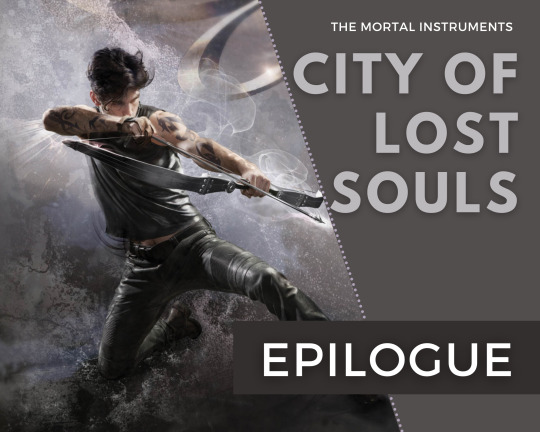
Of rewritten family relationships, my pure hatred for Alec's storyline, and wandering parabatai runes.
Jace slowly wakes up in the Institute infirmary with Alec and Isabelle by his side. This scene is Clare’s attempt to alleviate responsibility on Jace’s part. This is also a point of realization as to how Clare talks about how Jace and Clary didn’t really have a relationship in this book because Jace was not himself, but Jace hasn’t had a relationship with Alec nor Isabelle since City of Glass. And even then on Alec’s part it was shit.
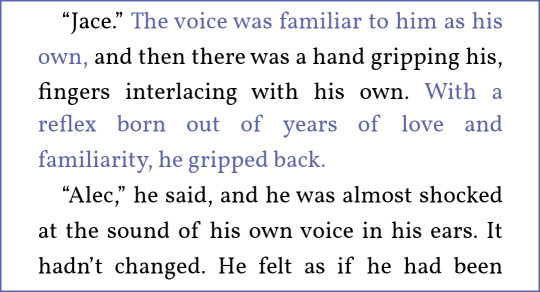
Not once have Jace and Alec been like this. This could’ve been a point of growing back together after growing apart first if that apart point was ever realized by the narrative.
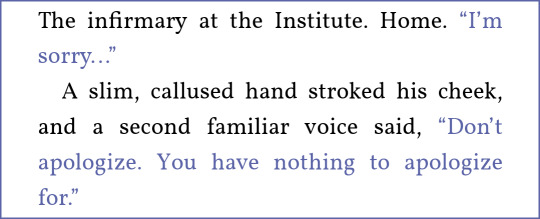
Jace’s apology comes off as performative and ostensible because 1. What is he even apologizing for 2. Isabelle gives him absolution for all of it anyway 3. He will never be held accountable for any bad decisions that lead to bad shit and circumstances.
Jace shouldn’t apologize for what he was put through, of course. Some responsibility should’ve been recognized far before this, however.

Fuck off. Clare wrote Will and Jem and only then found some sense in Jace and Alec. It is similarly rewriting history as with the whole idea of Jace being gentle with things he loved.
PLACEMENT OF THE PARABATAI RUNES. It is interesting to note that during the introduction to the concept of parabatai it was never told there were runes placed upon the pair. There is barely a mention of them in TMI, and without this one uncertain scene in the epilogue of CoLS, it is never told where Jace has it. (“We never got to finish our conversation, before,” Jace said. “I just wanted to say that you don’t always have to be all right. I asked you to be my parabatai because I needed you, but you’re allowed to need me, too. This”—he indicated his own parabatai rune—) → in CoHF
→ “He raised his sleeve, showing Jocelyn the parabatai rune on his inner forearm.” Alec in City of Fallen Angels, Chapter 6 “No Weapon in This World”
→ “Alec said nothing, but his grip on Jace’s hand tightened. “You don’t need to swear,” he said, and with his free hand touched the parabatai rune near his collarbone. “I know. I can feel it. I don’t feel like I’m missing a part of me anymore.” City of Lost Souls, here in the epilogue
Whose collarbone, though? It’s difficult to infer, because the use of pronouns indicates himself, not Jace. I’ll then go even a step further, because in City of Heavenly Fire Alec’s rune also keeps wandering:
→ “It is good, but what I felt”—Alec put his hand unconsciously over his upper arm, near his parabatai rune—“that isn’t good. Jace isn’t dead,” Chapter 8 “Strength in What Remains”
→ “Alec pushed aside his jacket, shoved down the collar of his shirt, and craned to see the mark on his shoulder. Simon recognized the outlines of the parabatai rune. Alec pressed his fingers to it; they came away smudged with something dark that looked like a smear of ash.” Chapter 8 “Strength in What Remains”
These two parts above are actually like two pages apart and the same scene too….
→ “Alec said, “Isabelle. Come on.” He was holding the shoulder marked by his parabatai rune stiffly.” Chapter 8 “Strength in What Remains”
→ “Alec staggered to his feet, his face dead white except where it was smeared black with soot. He spun, turning his back to Isabelle, shrugging down his gear jacket. “My parabatai rune—can you see it?” Isabelle felt her stomach drop; she thought for a moment she might faint. She grabbed at Alec’s collar, pulled it down, and exhaled a hard breath of relief. “It’s still there.”” Chapter 17 “Burnt Offerings”
How come Alec was able to crane his neck to see the rune before but not in this instance? Shit writing, that’s what.
Anyway, onward we go.
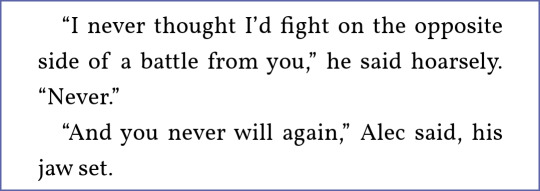
They should’ve actually fought.

Again, fuck off, but also, yay.
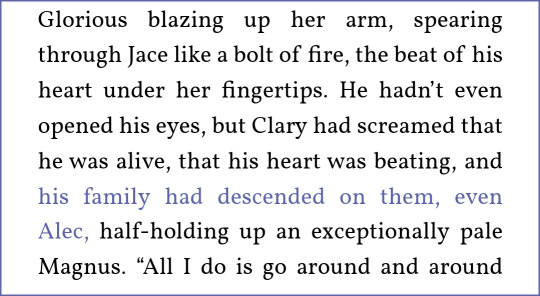
WHAT DO YOU MEAN EVEN ALEC??? His brother, bestie, parabatai is lying on the ground seemingly dead and ugh, I guess even Alec made his way theereee
Reminds me of this, but in this case we actually know WHY EVEN ALEC.
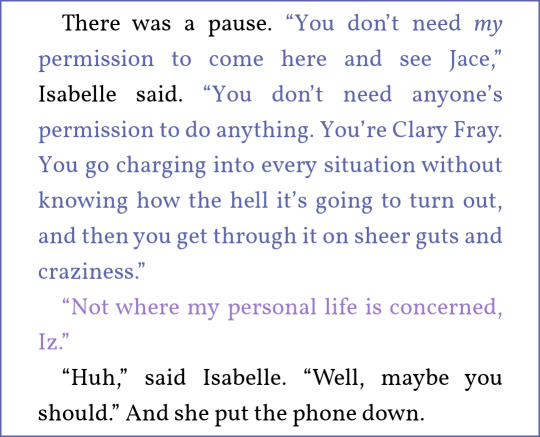
Five books and the culmination of character growth is, let’s let Clary do just whatever she wants because she is Clary and everything she does is right. That’s actually more development for Isabelle since she berated Clary for the same thing in City of Glass.
There’s been couple instances where Clary’s character is being praised by others, this just being one of them.
→ Wasn’t City of Glass exactly where Clary’s “personal life” was “considered”?
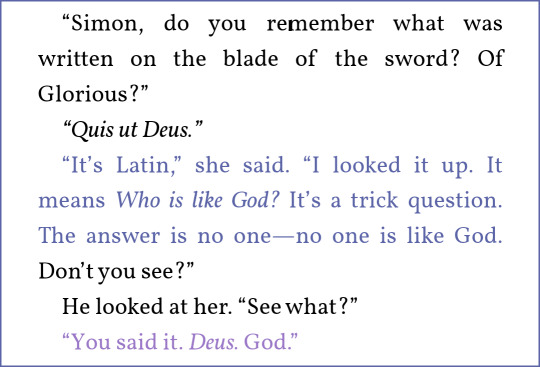
Sure, but also the literal translation of the name Michael. You know, the Archangel. Also yay, Simon.
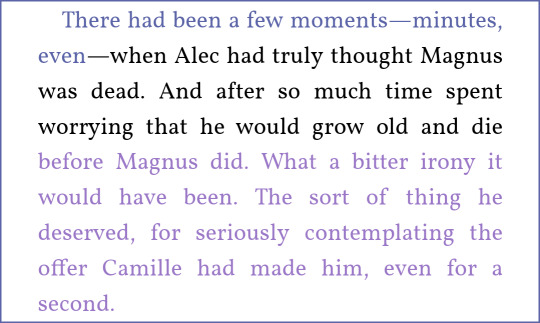
→ How do these few moments become minutes, even, when Alec made his way immediately to Magnus
→ I might be tired and not reading this right, but to me this sounds like Alec thinks he deserved to have died (before Magnus) for even a second thinking about what Camille offered. What, dude. No.
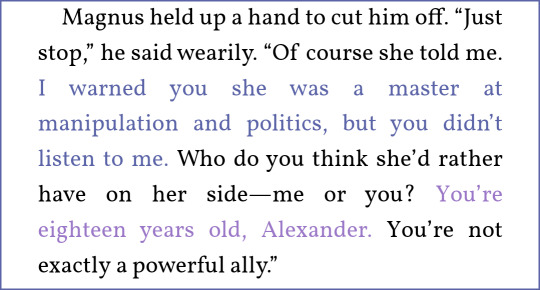
Was there some point in the whole of this relationship where Magnus’ behavior somehow promoted intimate trust required to be in a relationship? And now he is somehow surprised that Alec didn’t fully trust or believe him? That Magnus’ secrecy did nothing to show Alec he is necessary and required, not a passing part in Magnus’ life?
→ Yes, do please underline more the fact how young Alec is compared to you. And this makes Magnus look better? This whole book on Alec’s part has been two old-as-fuck adults screwing over a teenager and playing him in their own ways.
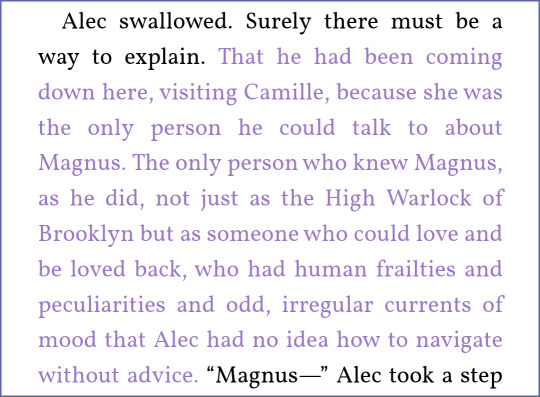
→ There must be a way to explain. Well, how about you just say all that? Though Alec not being good with words is consistent with his inner monologue.
And here we have it. How the hell did this relationship have any future? It’s all there, and Magnus is not written taking any responsibility for it (CoHF is the best book out of all six solely for the fact that Alec actually says what needs to be said in it). Alec’s insecurity is of his own to mend and build up, but sheesh.
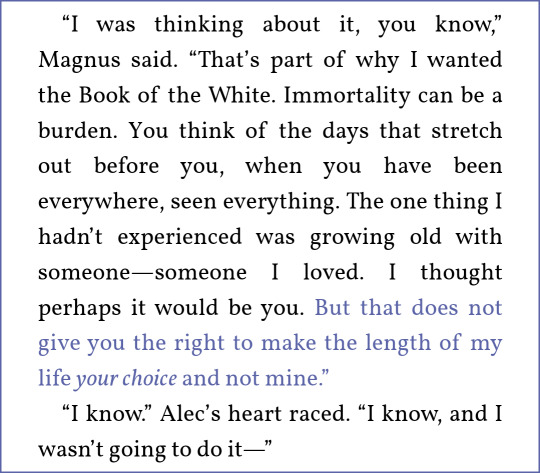
Apples and oranges, but isn’t it a bit ironic how Alec was the one pressured to come out of closet and tell his family about Magnus only weeks after dating, how the story pretended it was Alec’s choice and not everyone treating him as lesser and talking shit about him for not doing it. Alec is held responsible for this mistake. Where is everyone else’s responsibility for what they did to Alec and how they treated him?
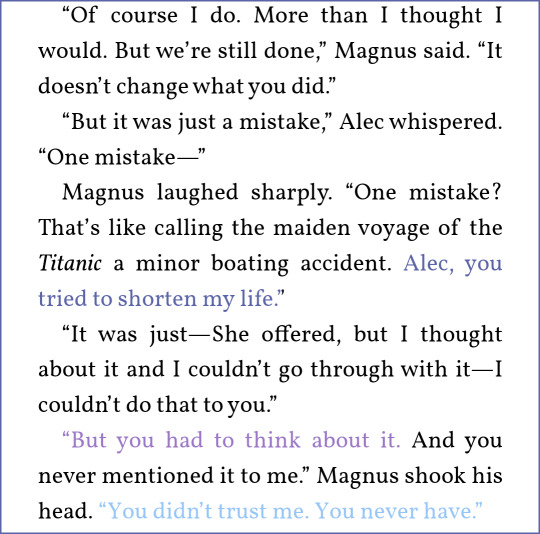
→ But he didn’t try anything? Alec did nothing and took no steps towards that. What he did was meet up with Camille in order to learn things about Magnus Magnus himself was not willing to tell. Camille offered and Alec refused (after even considering it).
→ I find this punishment of thought ridiculous. One can entertain ideas and thoughts and conclude that they could never do this or that. ?? We do this constantly when we ponder ethics or hypothetical situations. Thoughts, feelings, and actions are not the same. Also, why Alec had to think about it? Because the offer was so outrageous he had to take time to realize what the hell? Because he was in with the idea of actually doing it and not thinking about the consequences? Because this type of stuff thrown at his face takes time to chew down? It matters.
→ And why do you think that is? Alec not trusting Magnus while having nothing to trust is somehow all Alec’s fault.
Alec is wrong and does wrong, but this I’m not going to just swallow and take as offered.
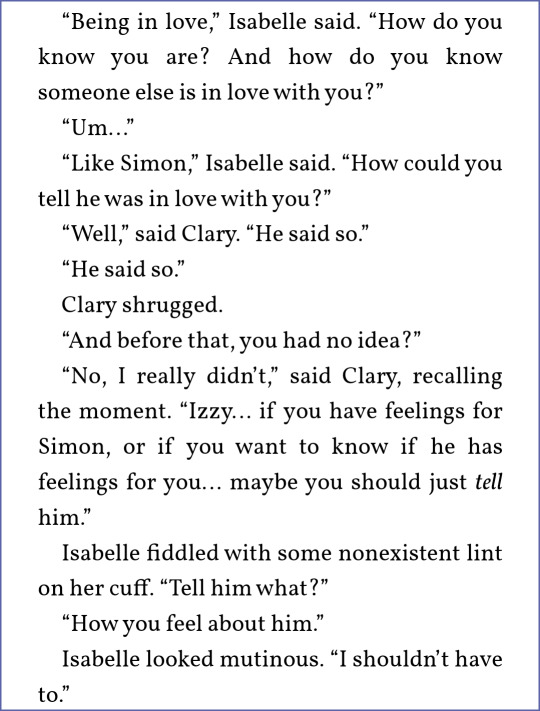
But they did talk about how they did like each other?
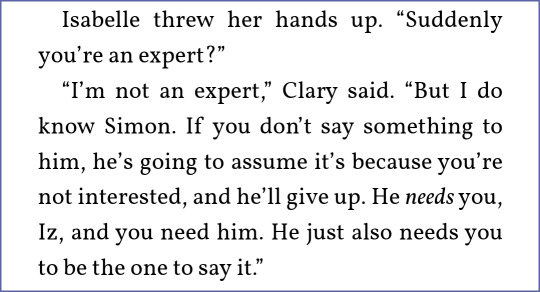
Isabelle has said it?
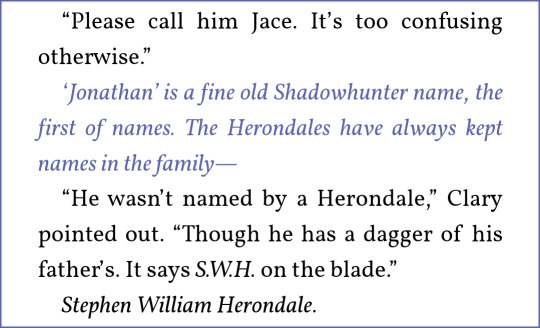
Fuck off, Jem. His name is Jace, how many times it needs to be said and by how many people?
→ The Herondales have kept names in the family— what?
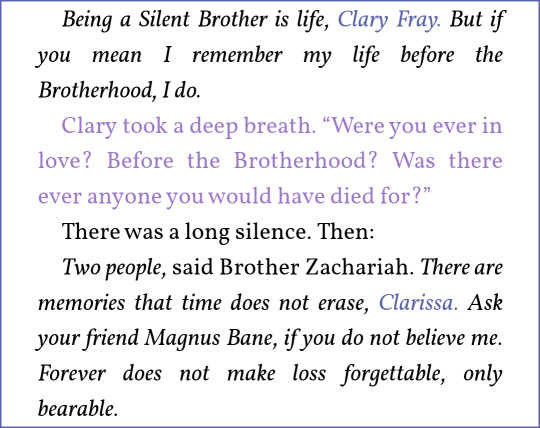
→ Clary, Clarissa. Could we hold onto some consistency here?
→ This conversation piece because we needed a TID reference.
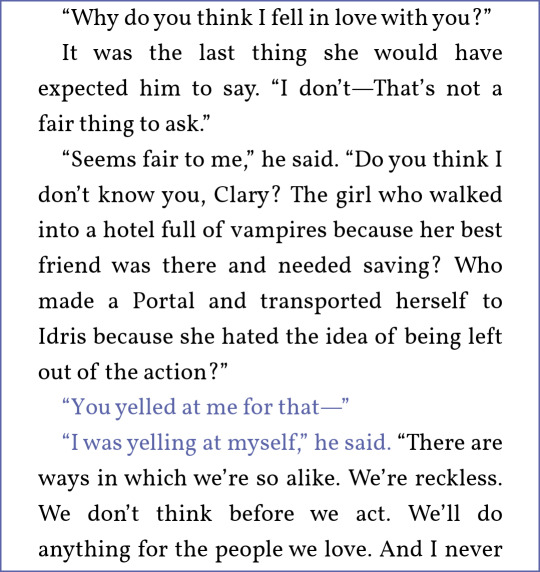
You both should be yelled at.
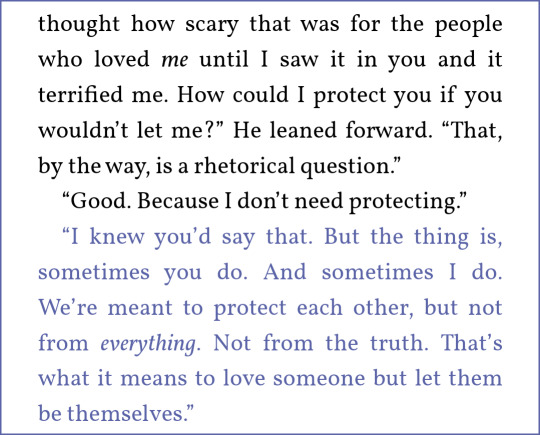
These are some truly profound thoughts.
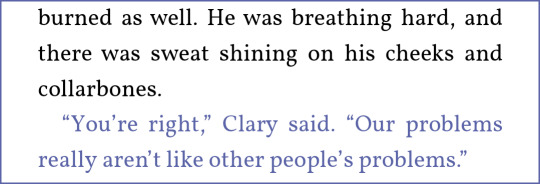
They aren’t, but I am also so sick of you both being Special, so fuck off.

→ If Alec is half of his soul and Clary is a part of that other half, then how much soul does Jace have for himself? Math question.
→ Great how we’ve somehow arrived to the point where Jace actually seems to care about his family, but also at the same time he is on his own without Clary?
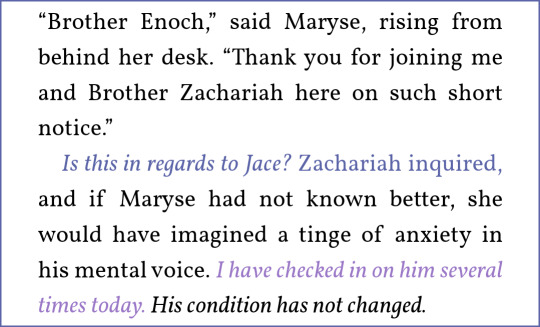
→ He learns quickly.
→ I understand that Jem is obsessed with Tessa and Will’s descendants, but they are their own people whose actions and personality and being has nothing to do with them. Was Jem as obsessed with every Herondale son on the way to Jace?
The book then finally ends with an edgy comeback note from Sebastian. Woowee.
#Clary Fray#Jace Herondale#Alec Lightwood#Magnus Bane#Isabelle Lightwood#Simon Lewis#CoLS Epilogue#City of Lost Souls
12 notes
·
View notes
Text

Did you know Amatis is Luke’s sister? If you didn’t, after this chapter you will.
The last chapter ended with Amatis being brought to be the first to drink from the Infernal Cup.

Thank you for reminding me. Didn’t I tell you to let go of my hand somewhere around chapter 19? (during the whole series more like)
→ Amatis looked up, her blue eyes so much like Luke’s, fastening on Clary.

I would allow this one if we weren’t told twice on the same page that Amatis is Luke’s sister.

The whole series has been Clary’s brother, Clary’s mother, Jocelyn’s daughter, Luke’s sister etc. Just use their names.

“The older woman” is in comparison to Clary because there are no others mentioned as of yet in the scene. As if Clary is a woman at all yet instead of a teenage girl.
→ Clary stared at her, willing the woman to look at her.
OH, SHE’S LUKE’S SISTER? I DIDN’T KNOW THAT EVEN THOUGH THIS IS THE THIRD TIME YOU HAPPENED TO MENTION IT.
→ …willing the woman to look at her. If things had gone as planned, she would have been Clary’s step-aunt now.
Because we know who Luke is to Clary, we know who Amatis is—that is just nonsense reminder and my HAND HURTS.

Also thanks for the recap. We read the scene. Also how couldn’t Clary realize it when Jace explicitly says it? (Chapter 18)
“Or, should I say, he did. That thing that looks like me but isn’t? He’ll burn down the world if Sebastian wants him to, and laugh while he’s doing it. That’s what you’re saving, Clary. That. Don’t you understand? I’d rather be dead—“

Don’t spoil the following action with these.
→ “Clary—,” Jace began. There was a cry...

Why are the werewolves attacking straight on but the Nephilim act like they are on an evening stroll? What kind of surprise attack is that?

I will strangle something.



This is Maia’s PoV, stop filtering.
→ A slender man had used a short-bladed dagger to whip the head off…

Simon is realizing great many things. These are observations he can make, you don’t need to justify them with these feeble justifications.
→ They were also faster than any Nephilim he has seen before.
Because we don’t need that information in between an action scene and especially not interrupting this sentence. Again, very reminiscent of Clary’s fight with the Ravener in CoB.
Additionally, I don’t think this is the place to prop Jace or Sebastian up.

Jocelyn never stood with Valentine but attended supremacist Circle ceremonies and dressed in a ceremonial dress.

Also on the fence about this.
→ Before Jocelyn could reply, blood burst from his mouth. (maybe)
→ also unintentionally comical.

OH MY GOD, STOP REMEMBERING THINGS.
→ Also no recognition that this is precisely what started this.

Before this there is this part:
“But that voice blurred into another, more recent one: Jace facing down Sebastian in the living room of Valentine’s apartment, telling her that he would rather die than live like this.”
And still there was the part before where it says Clary didn’t realize it? What even is consistency? At least in this chapter we are consistently reminded that Amatis is Luke’s sister.
→ What is looove, when truthfulness isn’t something any of these character are capable of most of the time?

→ The repetition for emphasis and dramatic effect doesn’t work.
→ His eyes blazed up the way they had…
That’s badass, stab him!!! So Jace apparently dies but doesn’t really, Alec helps Magnus to heal, the dark Nephilim scatter, and the battle ends. And it’s great solely for the fact that there is only the epilogue left.
#Clary Fray#Jace Herondale#Sebastian Morgenstern#Simon Lewis#Amatis Graymark#CoLS Chapter 21#City of Lost Souls
11 notes
·
View notes
Text

Clary doesn’t manage the escape from Sebastian and is thus forced to attend the following ceremony so we can finally get to the climax of this book. Eventually…

→ Glaring anyone through eyelashes (many characters do this in the series) is a dumb expression and even more so dumber when you try to do it yourself. Nobody who does that expression looks serious rather than petulant.
→ I don’t like the structure here: …when he’d carried her away from the Dahak demons. Then she had been confused, if not grateful, but now she was filled with a boiling hatred.
Feels more effective, especially making the distinction between the more positive-like feelings Clary experienced towards Sebastian before and the outright negative ones here. (and → but)
We cut to Maia and Jordan. Jordan receives the news of his roommate’s death.

Kissing, cuddling, or even sex don’t exclude commitment or caring, though can be done without neither. Comforting can be inauthentic and without true caring as well. Sometimes it’s difficult to differentiate individual thoughts belonging to characters from the preachy aspect of Clare’s writing because her characters mostly think the same way and have same opinions. And I don’t really care for any of it at all.
Maia then comforts Jordan and receives the call for battle from her pack. Cut back to Clary and Sebastian and me wishing this thing would finish itself sooner because these books are exhausting. Anyway.

Sebastian is a vile misogynist, I get it. Individual Shadowhunters can hate scars or think they are ugly, I get it. But for people that it is the way of life, causation of their abilities and very essence, scars are, primarily, nonissue. It’s lazy and boring to have every character appraising scars—someone else’s or their own—with such intensity and so incessantly throughout the series.
Cut to Alec and Isabelle at the Institute.

Being Jace’s parabatai has less to do with the fact that he is used to conversational tangent. Try brother or best friend. Parabatai came after.

If there ever was a truer fact that was in accordance with the actual writing, it is this. Simon continues to prioritize Clary, even after when Simon hasn’t been Clary’s priority for some time now, if he ever even truly was.

Interesting development, considering they met only a short time ago. Which seems like these background LGBT relationships have to be rushed in order to be taken seriously as representation.
→ Isabelle’s eyebrows went up.

The hell is the point of leading the Clave if you can’t do shit to stop shit. Plot convenience, that’s what.

Once again I’d like to remind us all that people are in this position because Clary and Jace lied by omission and hid the truth. The milk has already spilled and gone stale on the table but because no one ever holds them responsible, I will. Forever and ever.
Cut to Team Evil. They've arrived to the ceremonial site and Clary reveals she has destroyed the Moving House of Valentine.

Once again, I’d really like if Clare managed to write something else than characters remembering something when she needs to call back on some scene. It’s the only way she seems to know how to write this stuff and it persist throughout TDA and TLH also.

Why would Jace care or do something about it if his enthralled and connected to Sebastian? Jace’s wants are Sebastian’s wants, it was clearly stated. Clary’s threat shouldn’t stop anything.

I like this part. The hatred for the uncaring creator and the resentment born from it. A good motivation for disillusioned bad guys.

Isn’t a bit strange that Raziel doesn’t give a shit if the Nephilim abandon their mandate and turn on him? What if the Nephilim took over the mundane world? There isn’t a threat of Raziel if they don’t do their Shadowhunting duties, is there?
Sebastian summons Lilith, she gives her blood for the Infernal Cup, and Sebastian wants to test it on someone who is revealed to be a kidnapped Amatis. What a twist.
#Clary Fray#Sebastian Morgenstern#Jace Herondale#Maia Roberts#Jordan Kyle#CoLS Chapter 20#City of Lost Souls
8 notes
·
View notes
Text

Clary is looking for the lost faerie ring which ushers us into the chapter that gets utterly disgusting. Which, I’m sure, it fully intends to be. Yet it doesn’t negate the fact that the writing and approach here is irresponsible.
(Includes sexual assault)

How is Jace’s neat and spotless room dusty? There was this scene before:
“Give me a second to clean up the room. It’s a mess.” “Yeah, when I was in there before, I think I might actually have seen a fleck of dust on the windowsill. You’d better get on that.”
I can’t believe Jace isn’t as clean as they claim! I am clutching my pearls as we speak.
→ Also, no semicolon. Just period.
Sebastian interrupts Clary’s search and brings her a ceremonial dress for the big night.

The Nephilim are very particular about what parts of the human culture they adopt and which parts they just come up by themselves.
→ Do they wear red in the parabatai ceremony? Or did we forget about that

How is Jocelyn’s character so divorced from the whole concept of the Circle, the supremacist ideas of Valentine and being married to said Valentine, and yet she wore a ceremonial dress to the Circle ceremonies and attended them.
→ Also now it’s “our mother” when Sebastian was so adamant before that Jocelyn was only Clary’s mother when Clary dared to call her “our mother”?
Sebastian leaves Clary to get dressed, but instead Clary infiltrates Sebastian’s room to look for the ring. Which she finds. Dun dun dunnn.
Cut to Simon sitting in the car with the rest of the Team Good. Clary then contacts Simon via the rings, like finally.

Completely unnecessary?
Clary spills the beans about Sebastian’s plan, but is then cut off. Simon orders the truck to be pulled over because the Team Good needs an action plan. We cut back to Clary which leads us to the most disgusting scene in the entire book, and what only feeds into the incest fetish going on in the series.

This scene that suddenly takes a sexual tone, excluding the cuts to Simon, includes Sebastian forcing himself on Clary by kissing her and then trying to strip her jeans.
Inclusion of dark themes, exploration of those themes, is not the issue. Uncomfortable themes and scenes are not the issue. Bad and awful things happening to the characters is not the issue. It needs to be considered how responsibly the theme is handled in the book, the level of detail gone into, and also whether in which case is it geared towards adolescents or adults. It is critical to understand how the writing actually addresses these.
Sebastian’s villainy is used often to explain his sexual approach to Clary, his sister, and his disregard of human morals and taboos. It is also used to justify this type of content in the series. Because Sebastian is demon-like, corrupted by demonic blood—which ever shit excuse Clare manages any given time—it’s only natural for him to behave like this, to be so morally corrupted that he would do this.
While there is literature, fiction and nonfiction, that is/might be helpful dealing and coming to terms with SA and related trauma, especially considering still adolescent readers, Clare’s most definitely is not. What is the benefit here—narrative or otherwise—of having Clary being assaulted? By her brother no less? Its primary target is to underline and over-pronounce villainy of a character that we already know is evil. Child murder and the need to commit multiple genocides apparently were not enough build a convincing narrative of a villain. No, what we clearly needed was more incest and sexual depravity.
Inclusion of dark and difficult things should be in order to cultivate empathy towards the victim and understanding of what is actual lived human experience, not have your villain use SA as a literary prop to show the reader how bad and twisted he is and make another character go through horrible trauma just for the sake of it. Considering also that Clary has no reaction to it at all. Additionally, when looking at the tone of the writing, it is almost like intended as borderline sexy, but just enough to toe the line and then back away if needed in face of backlash.
TMI—nor the whole of TSC—does not deal with sexual assault (it doesn’t deal with incest truly either). If we go back to City of Glass, how was Aline or her experience considered at all? In similar vein, the writing here uses SA as dramatic effect. Almost shock value. Clary fighting Sebastian after this is probably intended as empowering, but does it make it less so even if the act of SA was not included? No. This was completely useless, disgusting, and negligent.

Should have kicked him in the dick.
We cut back to Team Good at their Team Talk Time.

Unintentionally hilarious mental image.

What a useless piece of a conversation.

Conveniently. Is there a habit of sending prank messages? What is the point of fire-messages—a form of quick and effective communication—if people don’t trust the contents? Plot convenience, that’s what. (While I get that delivering the information face-to-face is more effective, but maybe a heads-up?)
Cut back to Sebastian and Clary. Sebastian reveals Clary that he knew all along Clary would be a traitor to their cause.

I am so tired. I don’t know how many of these you’re like me, no I am not, you’re like your mother, sajdkahsdkjsad conversations I can take. It has become so repetitive that I‘m going to barf.

“The past is a foreign country; they do things differently there.” ― L.P. Hartley, The Go-Between
A quote Jace and Sebastian cite themselves in this book. Should ponder more on that. Also, what the hell do the Nephilim even know about their DNA or how it behaves.
→ Strengthens the risk of genetic disorders, really.
My soul needs scrubbing after this.

There’s no winning with this. The narrative around the whole incest bullshit twists in on itself that sometimes it’s hard to even understand where it stands or what it wants to even say. There must be something broken in me that I cannot kiss anyone but Jace who I believe to be my brother by the same parents. Not that there was something wrong with her that she wanted to kiss just someone who she thought was her brother.
The series makes this point several times: family is not defined by blood relations. But also these characters are related by blood (or think they are) and are in love with each other, because it’s kinky for the author.

→ Unnecessary pauses take away the urgency of the action.
→ Clary just punched him, no need to reiterate that point. You can let go of my hand, thank you. “She whirled and kicked him hard in the stomach, hoping it was still sore.”

→ Thank you for telling me right after showing me.
→ I wish Clary (or any character for that matter) stopped remembering things whenever Clare needs to call back on a scene. “Time slowed like during the fight in the junk shop in Prague, where she had disappeared into her own world…” Or something.

*The Hebrew Bible.
Googled a bit about the Song of Songs/The Song of Solomon, and many have pondered on the incestuous aspect of it (4:1-5:1). Mostly the answer seems to be no, it’s not about incest but sublimity of love, the use of ‘brother’ and ‘sister’ is not literal and used differently in ancient Israel… I am not well versed in any of the Bible talk, but my quick research gives me an impression that Sebastian is interpreting the Song of Songs whatever way fits him and his feelings for Clary the best. Which, considering, would not be out of character for him.
→ Let’s not do the “It’s in the Bible” arguments or justifications ever again.

IS THAT YOUR ONLY DEFENSE ON THIS MATTER?
In the end of the chapter Clary manages to outweigh Sebastian, and the chapter ends with a stupid cliffhanger Clary bringing a shard of glass down at Sebastian. (Spoiler: she strikes the floor inches from Sebastian’s throat because she can’t kill Jace as well. ...Yet :^D)
#It's all kinds of fucked up#Clary Fray#Sebastian Morgenstern#Jace Herondale#CoLS Chapter 19#City of Lost Souls
5 notes
·
View notes